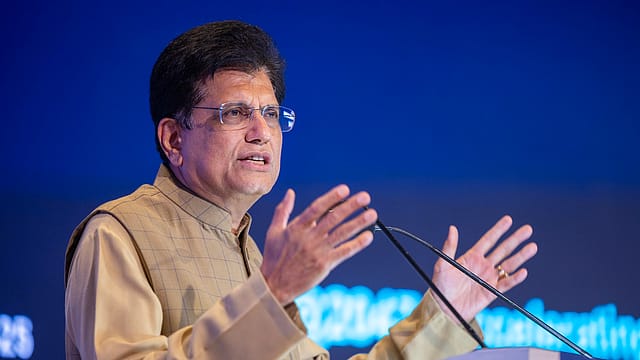India fastest growing economy despite global turmoil; GST rate cut to boost consumption: Piyush Goyal
ADVERTISEMENT

Union Commerce and Industry Minister Piyush Goyal, speaking at the Bharat Nutraverse Expo 2025 today, said the reduction in GST rates will provide a tremendous and unprecedented boost to consumption demand. The industry, he said, can now aspire for a much greater volume of sales, creating a win-win situation for all.
He reiterated the government’s vision of taking India’s GDP from $4 trillion to $30 trillion by 2047, saying that India continues to be the fastest growing big economy of the world in times of turmoil. The industry should ensure that every rupee saved through the GST reduction is passed on to consumers, said Goyal. He said under the new structure, GST on several categories has been reduced to as low as 5%, resulting in substantial savings across the sector. "This will act as a strong demand booster, as lower prices naturally drive higher consumption and accelerate industry growth."
On Prime Minister's call to 'Make in India' to increase self-reliance, Goyal said it does not matter whether a company is Indian or foreign, as long as it is investing in India, creating jobs, generating opportunities, and contributing to the country’s growth story. Referring to India’s robust economic performance, he said India's GDP grew by 7.8% in the first quarter.
The minister said the nutraceuticals industry should make a twin commitment to the Prime Minister—first, to pass on every rupee of savings from the GST reduction to consumers, and second, to actively promote Indian products. He stressed the need to support products made with the sweat and toil of hardworking Indians, products nurtured in the soil of India.
The GST Council led by Finance Minister Nirmala Sithraman on Wednesday announced big measures to slash GST slabs from to two. The FM said the GST Council unanimously approved dual GST slabs of 5% and 18%, which will come into force on September 22. Prime Minister Narendra Modi said the measures will immensly benefit the common man, farmers, MSMEs, the middle class, women, and youth. "The wide-ranging reforms will improve the lives of our citizens and ensure ease of doing business for all, especially small traders and businesses," said the Prime Minister.
Experts say the GST cut could boost India's GDP by 0.1-0.16 ppt and lower inflation by 40-60bps on an annual basis. A latest research note by global financial bank Standard Chartered Bank says the GDP impact for FY26 might be smaller than estimated amid uncertainty on the duration of the 50% tariff on exports to the US. "We, therefore, maintain our FY26 GDP growth forecast at 6.9%."
It also estimates the GST cut could lower CPI inflation by 40-60bps on an annual basis. However, if a partial pass-through of these tax reductions to consumers is considered, the impact on FY26 headline CPI inflation could be in the range of 20-25 bps.